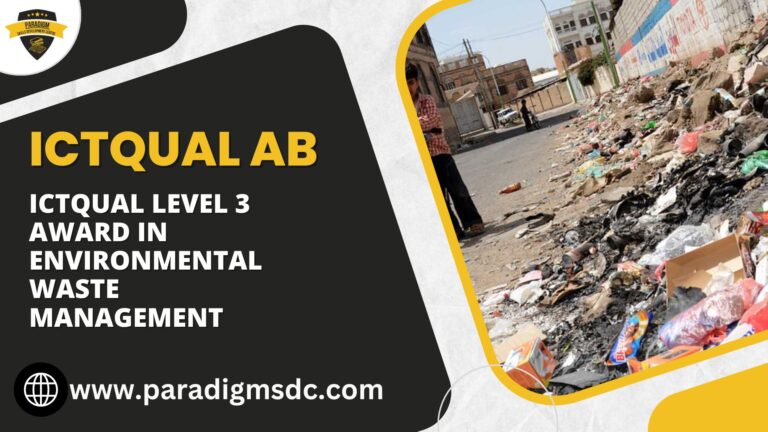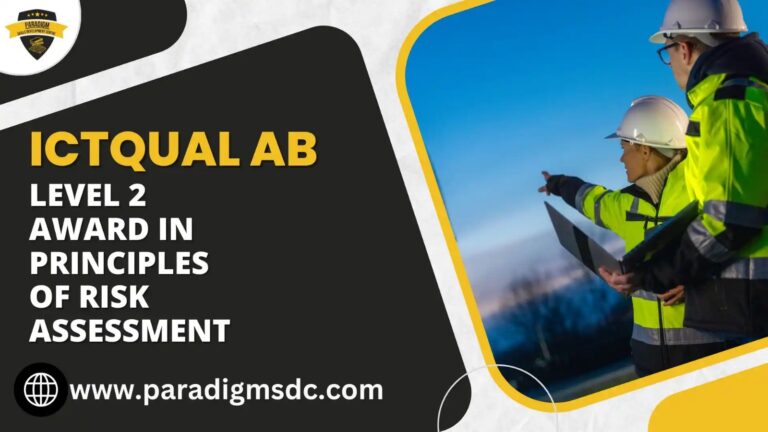Course Introduction
The ICTQual Level 2 Award in Emergency Rescue is recognized for its focus on practical skills and theoretical knowledge necessary for emergency rescue scenarios. Participants gain hands-on experience and theoretical grounding in various aspects of emergency response.
Course Overview
This course provides a balanced blend of theoretical learning and practical application, ensuring that participants are well-prepared for real-life emergency situations. It covers essential topics such as:
- Understanding emergency rescue operations
- Assessing risks and hazards in rescue environments
- Using rescue equipment effectively
- Communication and teamwork in rescue scenarios
Course Study Units
The study units typically include:
- Introduction to Emergency Rescue
- First Aid Essentials
- Emergency Response Procedures
- Search and Rescue Techniques
- Communication and Teamwork
- Crisis Management and Decision Making
- Ethical and Cultural Considerations
Learning Outcomes
By the end of the course, participants are expected to:
Introduction to Emergency Rescue
- Understanding Emergency Response: Participants will grasp the fundamental principles and objectives of emergency rescue, recognizing the importance of swift and effective response in mitigating risks and saving lives.
- Legal and Ethical Awareness: Learners will develop an awareness of legal and ethical considerations surrounding emergency rescue operations, ensuring compliance with relevant regulations and ethical standards.
First Aid Essentials
- Basic First Aid Skills: Participants will acquire essential first aid skills, including the ability to assess and manage common injuries and medical conditions effectively.
- CPR Proficiency: Learners will demonstrate competence in cardiopulmonary resuscitation (CPR) techniques, enabling them to provide life-saving assistance in cardiac arrest situations.
- Wound Care and Immobilization: Individuals will learn techniques for wound care, bandaging, and immobilization of injuries to prevent further harm and promote recovery.
Emergency Response Procedures
- Protocol Familiarity: Participants will become familiar with emergency response protocols and the chain of command, ensuring adherence to established procedures during crises.
- Effective Coordination: Learners will understand the importance of effective coordination with emergency services and external agencies, facilitating seamless collaboration in emergency response efforts.
Search and Rescue Techniques
- Locating and Assessing Individuals: Participants will develop the skills to locate and assess individuals in distress, utilizing various search and assessment techniques to identify and prioritize rescue priorities.
- Safe Extrication: Individuals will learn safe extrication and transportation techniques, ensuring the efficient and safe removal of injured or trapped individuals from hazardous situations.
- Equipment Proficiency: Learners will gain proficiency in the use of specialized equipment and tools essential for search and rescue operations, enhancing their effectiveness in emergency response scenarios.
Communication and Teamwork
- Effective Communication Skills: Participants will develop effective communication skills, enabling clear and concise communication with team members, emergency services, and individuals affected by emergencies.
- Team Dynamics: Learners will understand team dynamics and roles within an emergency response team, fostering cooperation, collaboration, and mutual support during crises.
Crisis Management and Decision Making
- Risk Assessment: Participants will learn to conduct risk assessments and make informed decisions under pressure and uncertainty, minimizing risks and optimizing outcomes during emergencies.
- Simulation Experience: Individuals will engage in simulation exercises to practice crisis management and decision-making skills, gaining confidence and competence in handling real-life emergency scenarios.
Ethical and Cultural Considerations
- Cultural Sensitivity: Participants will develop cultural sensitivity and respect for diversity, ensuring inclusive and culturally competent emergency response practices.
- Ethical Decision Making: Learners will navigate ethical dilemmas inherent in emergency response situations, making ethically sound decisions while upholding professional standards and integrity.
Course Benefits
- Practical Skills: Gain hands-on experience with rescue equipment and techniques.
- Career Advancement: Enhance your career prospects in emergency services and related fields.
- Certification: Obtain a recognized qualification that validates your competence in emergency rescue operations.
Who is This Course For?
This course is ideal for:
- Individuals aspiring to work in emergency services (e.g., firefighters, paramedics).
- Existing emergency responders looking to formalize their skills.
- Professionals in industries where emergency response knowledge is critical (e.g., construction, mining).
Future Progression
Upon completion of the ICTQual Level 2 Award in Emergency Rescue, participants can consider advancing their skills further through:
- Higher Level Qualifications: Progress to ICTQual Level 3 Diploma in Emergency Rescue or related fields.
- Specialized Training: Pursue additional training in specific areas of emergency response, such as advanced first aid or technical rescue.
- Career Development: Explore opportunities for career progression within emergency services or related industries.
In conclusion, the ICTQual Level 2 Award in Emergency Rescue equips individuals with the essential skills and knowledge to effectively respond to emergency situations. Whether you’re starting a career or seeking to enhance your capabilities, this course provides a solid foundation for success in the dynamic field of emergency rescue.







